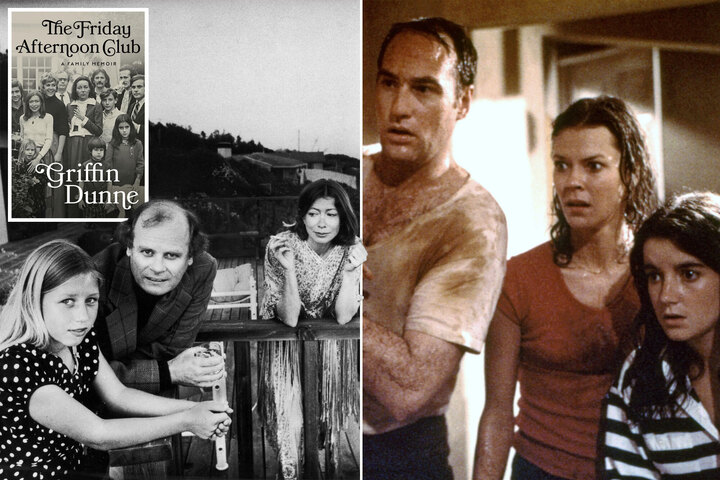
The tragic murder of young “Poltergeist” actress Dominique Dunne in 1982 nearly broke her famous family.
Dunne was 22 and a rising Hollywood starlet when she was killed by her ex-boyfriend John Sweeney outside her West Hollywood home. The resulting trial made a true-crime literary star of her film producer father, Dominick Dunne.
But as her brother, “This Is Us” actor Griffin Dunne, writes in his memoir “The Friday Afternoon Club,” out Tuesday, it also nearly ruined the relationship between Dominick and his novelist brother John Gregory Dunne and sister-in-law Joan Didion. The couple chose to go to Europe rather than risk their teenage daughter possibly being called to testify.
Griffin, 68, writes of his famed aunt and uncle: “The animosity between my father and his brother reached new heights with every passing day John stayed in Europe.”
In June of 1982, the Steven Spielberg-penned horror film “Poltergeist” was released and made a huge splash, vaulting Dominique — who played Dana and who had previous roles on the TV shows “Family” and “Breaking Away” — into stardom, along with Craig T. Nelson and child actress Heather O’Rourke.
Griffin writes that his sister met Sweeney when the latter was working as a chef at the trendy Los Angeles restaurant Ma Maison.
While the whole Dunne family disliked Sweeney, her first boyfriend, only Griffin and Dominique’s brother Alex spoke up, calling the chef a “phony, a star-f–king a-s-kisser,” according to the book.
Less than a month before Dominique’s 23rd birthday, she broke up with Sweeney and confided in Griffin that the chef was jealous, possessive and had once strangled her to the brink of her blacking out.
But she soon began second-guessing her decision, much to the annoyance of Griffin — who didn’t tell his sister that, days earlier, Sweeney had called him looking for reconciliation advice.
A furious Griffin told the chef to “stay the f–k away” from Dominique and if you “touch my sister again and I will kill you.”
On October 30, 1982, Sweeney showed up at Dominique’s house while she was rehearsing for the miniseries “V” with actor David Packer. After speaking to her ex through a locked door, Dominique stepped onto the porch while Packer remained inside. The two began to argue and Packer heard smacking sounds, screams and a thud.
Dominique had been strangled and was put on life support with no sign of brain activity.
Sweeney, who was standing over the actress’s unconscious body when officers arrived at her West Hollywood home, was charged with attempted murder and, after the Dunne family turned off Dominique’s life support, first-degree murder. That was later downgraded to second-degree murder.
When the trial started, Griffin writes, the defense tried to have his and Dominique’s mother, Lenny, who was in a wheelchair due to MS, barred from the courtroom “because her wheelchair was prejudicial enough to elicit the jury’s sympathy.”
The judge denied the request, in what would be one of the few times he ruled in the prosecution’s favor.
During the trial, Sweeney testified that he and Dominique had reconciled and had talked of getting married and having children but that, on October 30, Dominique abruptly changed her mind. Sweeney claimed that he “exploded and lunged toward her” and had no recollection of attacking her.
Sweeney’s ex-girlfriend Lillian Pierce was set to testify about him having allegedly put her in a hospital twice with injuries including a broken nose and collapsed lung. But the presiding judge granted a defense request that the jury be cleared from the courtroom, ruling that Pierce’s testimony might be “prejudicial.”
While Pierce was testifying without the jury present, Sweeney jumped from his seat and tried to flee the courtroom. Tackled and handcuffed, he sobbed that he hadn’t been trying to escape. The judge not only accepted the apology he even told the defendant: “We know what a strain you’re under, Mr. Sweeney.”
Meanwhile, Dominique’s aunt and uncle, Didion and John Dunne, chose to skip the trial and head to Paris — because, Griffin writes, they were worried their daughter, Quintana, would be called to testify.
Dominique would sometimes babysit Quintana, who was 16 at the time and who had a habit of sneaking out of the house to party.
Griffin writes of being “angered and hurt” that his uncle “never once checked in with my mother or me to see how we were holding up.” (Dominick and Lenny. had divorced in 1965.)
During the trial, Griffin — who starred in “An American Werewolf in London” and “After Hours” — was shooting the mob comedy “Johnny Dangerously” with Michael Keaton at night. He writes of befriending a couple of set extras who were “connected.”
One of them pulled Griffin aside one night.
“‘I just want you to know, Griffin, there is a way to make this trial go away by the end of the week,’” the extra, named Leo, said. “‘You and your family would never have to set foot in that courthouse again … I got friends who work where Piece of S–t [Sweeney] is being held, and they tell me he’s got a cell to himself.’”
While Leo told Griffin “you will owe me nothing nor ever hear from me after tomorrow night” if he accepted the offer, the actor ultimately turned him down.
Sweeney was found not guilty of second-degree murder and guilty of voluntary manslaughter and was sentenced to six years for the death of Dominique Dunne.
In March 1984, Vanity Fair published “Justice: A Father’s Account of the Trial of His Daughter’s Killer,” Dominick’s debut article about the family’s nightmarish legal odyssey. The piece made him a literary star and he went on to write such popular novels as “The Two Mrs. Grenvilles,” “People Like Us” and “An Inconvenient Woman.” He achieved even more fame as a true-crime writer during the OJ Simpson trial.














